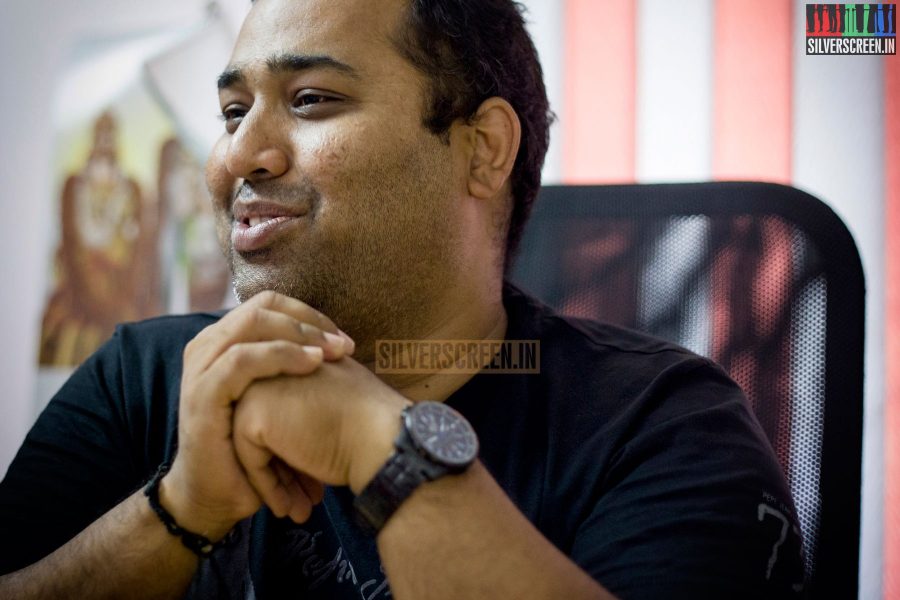When the auto stops in front of producer CV Kumar’s Valasaravakkam office, I check the address again.
Yes, there has been no mistake.
I see an old house, quite in need of a fresh coat of paint. The drawing room-turned-reception has a man sleeping on the sofa; magazines lie scattered on a wooden teapoy. Towards the right, there are some large unopened tin boxes (of film, perhaps?).
A burly man with a French beard is perched in front of a computer. He looks up as I enter.
“Are you Nikhil?”
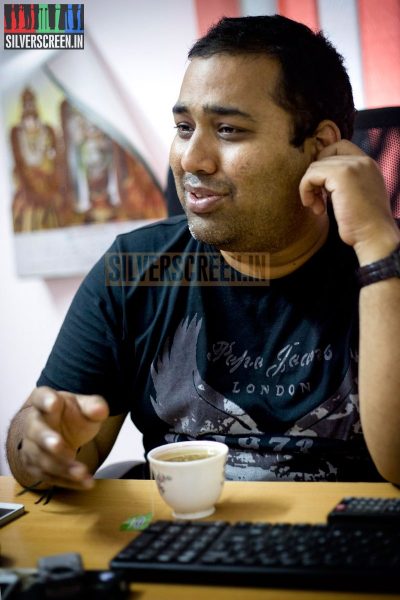
Producer CV Kumar Exclusive Photos for Silverscreen
His features relax as he talks. He offers me a chair.
30 minutes later, CV Kumar walks in, grins apologetically, and disappears inside.
I’m signaled to wait for a few more minutes.
Soon enough, I am ushered inside his office. Except for a number of trophies and souvenirs of his hit movies, there is no ostensive show of wealth. No display of his profitable trade.
CV Kumar is dressed simply. In jeans, and a black T-shirt. He seems weary; it’s probably been a long day for him.
Without further ado, we begin. Over steaming cups of green tea.
Everything seems deceptively simple when CV K
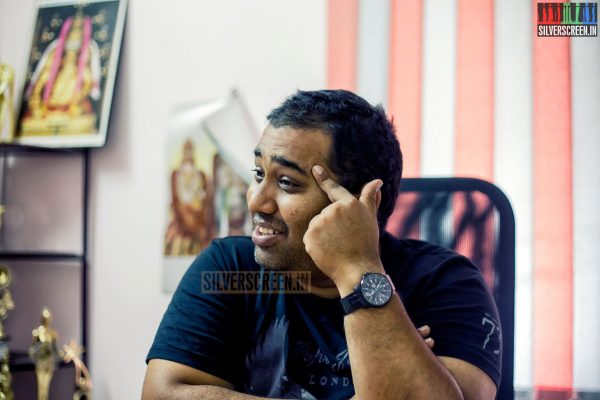
Producer CV Kumar Exclusive Photos for Silverscreen
Appadiyonnum kedayadhu madam is his constant refrain. He shrugs away most of the impressive tags that his name has become synonymous with. Particularly the ‘Kingmaker’ one. He still seems the small town boy at heart. A small town boy who has suddenly found himself in a big concrete jungle. There’s deep-rooted honesty in his thoughts. He’s clearly someone who would rather act than talk; and not get fooled by the highs and lows of his trade.
Kumar’s also quite clear about what drives him. Cinema. But not the business side of things. Every movie of his, he says, is something born out of passion, and that’s why, they seldom fail to click. He cites an example.
Lucia, which is being remade in Tamil (a first for him), is one such film. “I loved the idea. Karthik Subbaraj referred it to me. And it was composer Santhosh Narayanan who compelled me to remake it. It has a good concept. Concept-oriented films romba pudikkum.” This time though, he is moving away from tradition and opting for an established actor: Siddharth, who was quite keen to be a part of the project.
“Vera yaaravadha vechu padam pannadhey nu sonnan.”
Thanks to social-networking sites, the duo shares a lot of common friends. But all the same, Kumar admits, the actor was tailor-made for the role.
Does opting for successful remakes ease some pressure off his back? I ask him curiously. He smiles wryly in response.
“Endha movie-kum apdi oru pressure eduthukkamaatten. We do it with passion. And a remake doesn’t come with guaranteed profits. We only aim at making good films, and not for hits or flops or blockbusters.”

Salony Luthra Exclusive Photoshoot Stills for Silverscreen.in
With heroines, though he has always roped in relatively new actresses, there is a catch all the same.
“Mukhiyama, Tamil theriyadha heroines vendam.
Dialogue delivery is always a problem. It’s not about fluency, Tamil naakula varanum. Sometimes, production suffers in the process of teaching them.”
The source of the problem is a fundamental contradiction, Kumar says. If the actresses speak no Tamil, our directors speak no English. Yet they prefer non-Tamil speaking models.
He continues, citing the example of Salony Luthra who struggled with Tamil even though she was pretty committed. “When they brought Salony for Sarabham, I told the director, ‘neenga romba kashtapaduveenga’. Naan nenacha maadriye, it was a herculean task to teach her the dialogues. It required so many retakes as everything had to fall in place: dialogue delivery and expressions. Of course, she was a dedicated artiste, and we hired a private tutor for 30 days. Even then, ororu dialogue-um solli kuduthu, director romba kashtappattaaru. Enaku nallave theriyum.”
His typical work schedule begins when he gets the bound script. Once it gains his approval, he would let the director – who would most often double-up as the script-writer – decide on the cast and crew. He would throw in a few suggestions, of course. But the director would have the final say.
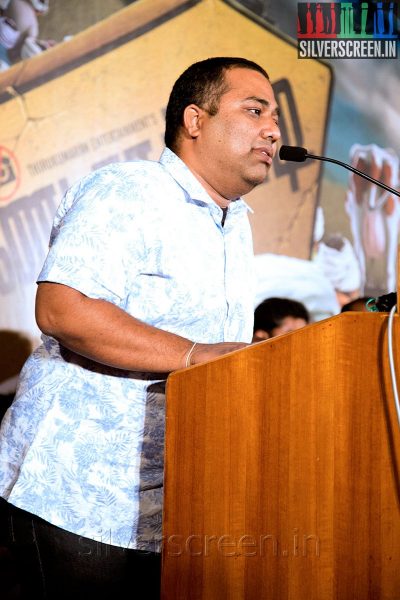
Producer CV Kumar at the Mundasupatti Press Meet
And when he went abroad on business – as an international packaged-tour manager – he was a regular at Disney Land and the Warner Brothers Studio. That triggered an interest in movie-making.
When he plunged into production back home, though, Kumar had no strategy in mind. “All I wanted to do was to make sensible and technically superior films. I had no genre in mind.”
Mokka padama irukka koodadhu. That was the sole criterion.
He remembers the few anxious moments they faced with Attakkathi – Thirukumaran Entertainment Productions’ first movie. They struggled to find distributors. “Romba kashtapatten. Even though we had a capable team of technicians, nobody was willing to take it as the cast and crew were new. Finally, Studio Green saved the day. If that film hadn’t worked, I would have gone back.
Oru padam thaan adutha padatha decide pannum.”
And while he admits that he expected the movie to get favourable reviews, he didn’t quite foresee the overwhelming response. “Naa ethir paakave illa. I am not a kalaignar, just a businessman. Critics see it differently. They have different parameters to judge a film. We can never see a movie in their perspective.” Kumar keeps track of all reviews that his movies garner – both good and bad – and he candidly admits that they affect him. “I have my own opinion, of course, but reviews, especially the ones we see on social networking sites, can make or break a film today.”
If not for budget constraints, Kumar reveals that Jigarthanda would have happened before Pizza. Karthik Subbaraj had sent him a message on Facebook, requesting 10 minutes of his time, and sent him the script of Jigarthanda. “Though I loved it, I knew it cannot be contained within our budget. He came up with Pizza after a while, and I signed him on immediately.”
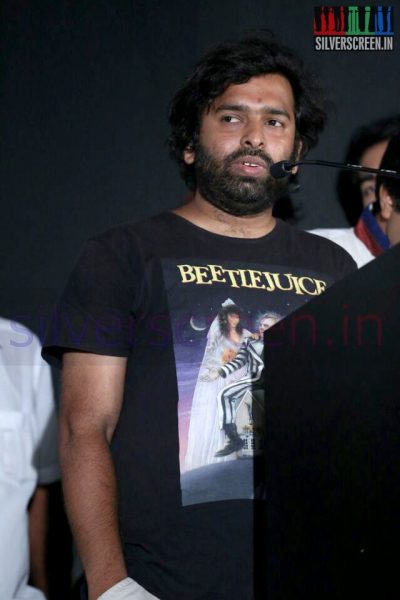
Music Director Santhosh Narayanan at Thottal Thodarum Audio Launch Function
Directors most often come with a definite plan of action – and that, Kumar observes – helps a producer immensely. He also lends a philosophical slant to his trade. “Everything runs on money, yet none of us sees it as a business. Whenever we take a calculated risk, our emphasis is on content reach not necessarily on the actor’s market value. Budget plays a key role as well.”
Which actor would he call a producer’s delight, I ask him suddenly. He plays it safe. “Everyone, in fact. From Attakkathi Dinesh to Naveen Chandra – I like them all.”
CV Kumar is also quite averse to those “add-ons” in his movies. In Soodhu Kavvum, he wasn’t too thrilled about the inclusion of the Kaasu Panam Dhuddu song, but acceded to the director’s wishes all the same. “In commercial movies, it would definitely be a crowd-puller. But mine is middle-of-the-road cinema.”
He’s also quite appalled by the seedy piracy nets and calls them “slow poison”. Smaller filmmakers are always the ones who bear the brunt of it, he fumes.
Kumar is also the one who introduced the not-so-popular concept of franchises in Tamil cinema. “The Pizza sequel was always there – right from the beginning – and it was my idea to rope in a different director. We wanted to make a new kind of film. Muni is the other one that worked. We will be coming up with more sequels for Pizza.”
A producer’s designation hasn’t changed over the years, Kumar says, waving his hand in protest. “It was more defined two decades ago. Whether one wants to be a banker or a producer is a choice that we have to make. Earlier, crucial decisions were made by the producer. He had great technical knowledge, and had healthy equations with the industry. At the end of the day, it is the producer who incurs the maximum loss,” he declares. “Though our role comes next to only that of the director, unfortunately, andha alavukku reputation kedayadhu. We are often relegated to the role of proposal makers and bankers. But of course, ever since the digital revolution, things are looking up for our tribe.”
He also prides himself on being a hands-on producer. Someone who is present on the sets every single day of the shoot, but never utters a word. At the editing table though, the cinema lover overrides the producer at times, and he offers valuable inputs.
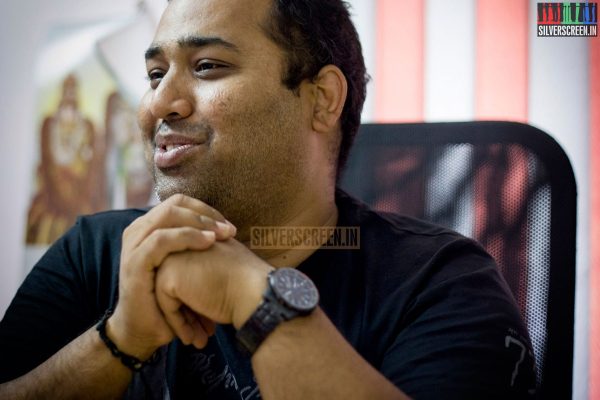
Producer CV Kumar Exclusive Photos for Silverscreen
While he is quite reluctant to call out favourites, Mundasupatti is a movie that he has watched several times in the theatre. He lets me in on a secret as well: he hasn’t watched many of his movies in the theatre. Pizza and Mundasupatti are exceptions.
Irudhi Suttru, helmed by Mani Ratnam’s former associate, Sudha Kongara is the next project from his stables. A bilingual, it has R Madhavan playing the role of a boxing coach. It is a joint production venture with Sashikanth, and Kumar admits the script has potential to go places. And, he’s got on board some of the best in the business: Editor KL Praveen, and cinematographer Sivakumar Vijayan (Vidiyum Munn).
A movie with a superstar is not on the cards though, Kumar is firm about it. He shakes his head in disbelief when I ask him. “That is a different ball game. Athukku enaku dhairiyamo powero kedayadhu. It’s serious business. Ella padathayum ellarum edukka mudiyaadhu. I can’t make such movies. Not just about the concept, there is a lot of money involved. I can practically make another 10 films on that budget.” But yes, he is a huge fan of Kamal Haasan and Rajinikanth. Baasha, Nayagan, Thalapathi, Indian, Azhagi…he lists his favourites.
Recommended
He’s also quite firm about something else as well. Those quirky movie posters. He insists on them. “When we feature unknown faces on the posters, nobody will notice. I want the audience to notice my poster, and give it a second look. So we brainstormed a lot and came up with this idea. We have allotted a special budget for it too.”
As we wind up the interview, he underlines a producer’s role. “Experience, great know-how about production, and technique. Without knowing all of that, you can’t handle that craft. Money alone won’t work. It is a very serious business. You can’t survive without any of these.”
Also, what about the movie that he’s directing, I ask him while exiting. “I will hold a press conference and let you know then.” He sees me off with a broad grin.
Lucia, produced by Thirukumaran Entertainment, releases this month.
